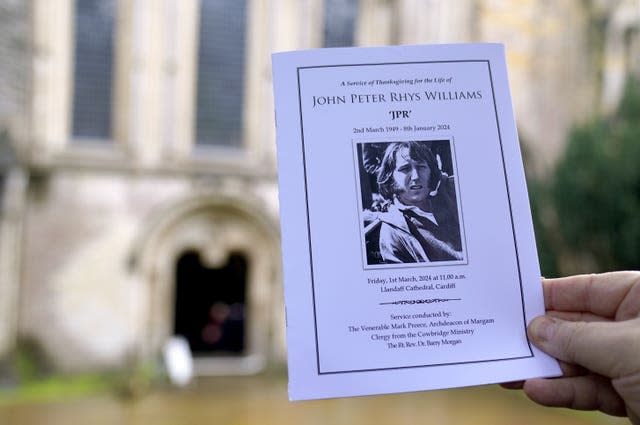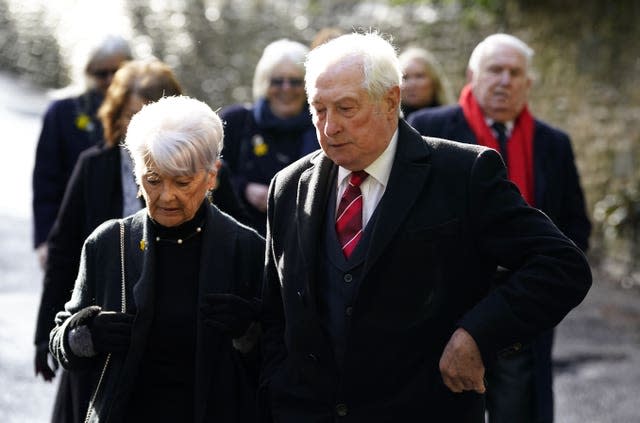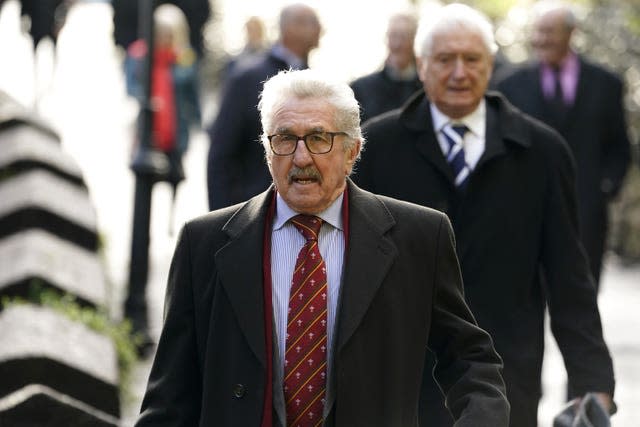Wales great JPR Williams remembered as rugby ‘revolutionary’ and family man
JPR Williams’ life as a rugby “revolutionary” and family man was remembered at a memorial service for the former Wales and British Lions full-back.
Williams died in January at the age of 74 and former team-mates from Welsh rugby’s golden 1970s era were among those who gathered at Llandaff Cathedral in Cardiff to celebrate his life on St David’s Day.
The tough-as-teak Williams gained a worldwide reputation for his fearless defensive play, rock-solid safety under a high ball and attacking prowess.

Williams won seven Five Nations titles, six Triple Crowns and three Grand Slams as Wales dominated the 1970s and starred on two victorious Lions tours, to New Zealand in 1971 – the only time they have won there – and in South Africa, three years later.
“On the field he was a revolutionary,” said John Taylor, a former London Welsh and Wales team-mate and Williams’ best man when he married wife Priscilla.
“JPR ripped up the rule book from the start. Wales went from 1934 to 1967 without a try from a full-back until Keith Jarrett scored there and he was really a centre.
“JPR scored six, five against England. He was the scourge of the men in white and the most competitive animal I’ve ever met.
“Nobody created the extra man better than he did.”

Williams’ love of music, he was a boy soprano – with his young voice played over a loud speaker in the Cathedral – before developing in to a rich baritone, was reflected during the service.
There were five hymns and a piece of reflection from the Bridgend Tabernacle Choir, of which Williams was a member and where he played the organ.
Williams, an orthopaedic surgeon who had studied at St Mary’s Hospital in London, also played the piano and the violin and the service concluded with a stirring rendition of the Welsh National Anthem, ‘Hen Wlad Fy Nhadau’.
Williams’ four children – Lauren, Annelise, Francine and Peter – read during a service where their father’s sporting prowess was recalled.
From 55 Wales caps – a world record upon his retirement in 1981 – to Lions tours; from winning a British junior competition at the All England Club, Wimbledon by beating former Great Britain Davis Cup captain David Lloyd to representing Wales’ senior squash team.
With his flowing long hair, sideburns and socks rolled down, Williams was an instantly-recognisable figure on the rugby field and was still playing for village team Tondu well into his 50s.
“I spent so much of my career on the field with JPR,” said Wales and Lions colleague Sir Gareth Edwards.
“He was a tremendous innovator and changed the full-back position virtually overnight.
“He would carry the ball back like a guided missile and had so many ways to beat the challenge of a defender.
“Whenever there were fisticuffs, he would run up and say ‘wait for me’. Phil (Bennett) and I would be running the other way.
“He was fearless, resilient and competitive – the ultimate warrior.”

Welsh Rugby Union president Terry Cobner described his former team-mate as “an icon and role model”, saying he had inspired a generation of youngsters “not only in Wales but throughout the world”.
Former Wales and Lions centre John Devereux recalled the impact Williams had on his local team Bridgend, both as a player and club president in later life.
Paying tribute at the service, journalist Peter Jackson said: “JPR – ‘the three most famous initials in the history of sport – initials that will forever evoke memories of glory days.”